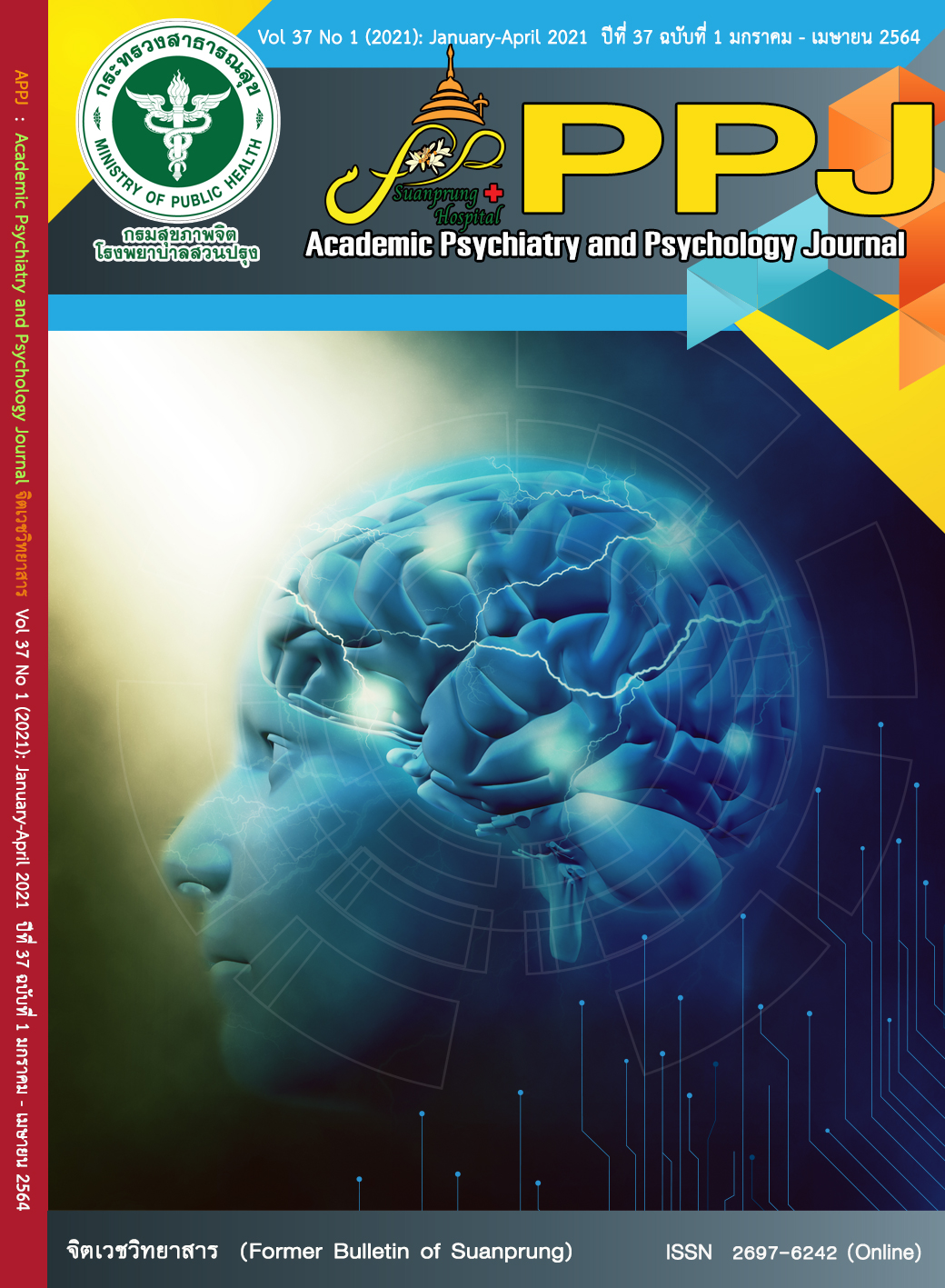The Psychological Experience of Volunteer Peer Supporters Who are Cancer Survivors
Main Article Content
Abstract
Objective: This research aimed to study the psychological experiences of volunteer peer supporters who are cancer survivors.
Methods: Participants were 7 subjects who had completed cancer treatment of at least 1 year and had been volunteering as peer support for cancer patients. Data were collected through semi-structured in-depth interviews from November 2019 – July 2020. The interpretative phenomenological analysis (IPA) method was employed in this research.
Results: Data analysis resulted in 3 main themes: (1) Cancer experiences lead participants to volunteer as a peer supporter for their understanding of thoughts and feelings of cancer patients, their knowledge for self-care, and philosophical understanding of the world and life; (2) The starting point for joining the cancer patient club included seeking information and receiving information from others; and (3) Factors that motivate peer supporters to continue volunteering included activities that benefit society, positive changes in oneself, and the readiness to support cancer patients.
Conclusion: The psychological experience of cancer survivors is an experience of deep understanding of cancer patients. Being a peer supporter positively affects the volunteer by enhancing self-esteem and generating more positive feelings.
Article Details
บทความหลังผ่านการปรับแก้จากกองบรรณาธิการแล้ว เป็นลิขสิทธ์ของวารสารจิตเวชวิทยาสาร โรงพยาบาลสวนปรุง กรมสุขภาพจิต กระทรวงสาธารณสุข ห้ามเผยแพร่เพื่อประโยชน์ทางการค้าโดยไม่ได้รับอนุญาต แต่อนุญาตให้เผยแพร่บทความดังกล่าวเพื่อประโยชน์ทางการศึกษาแก่ประชาชนทั่วไป ทั้งนี้กองบรรณาธิการไม่จำเป็นต้องเห็นด้วยกับบทความหรือข้อคิดเห็นใดๆ ที่ปรากฏในวารสารสวนปรุง
References
World Health Organization. Latest global cancer data: Cancer burden rises to 18.1 million new cases and 9.6 million cancer deaths in 2018 [Internet]. The International Agency for Research on Cancer. 2018 [updated 2018 Sep 12; cited 2020 Oct 3]. Available from: https://www.who.int/cancer/PRGlobocanFinal.pdf
Department of Medical Services, Ministry of Public Health. National Cancer Institute Strategic Plan 2019-2022 [Internet]. [cited 2020 Dec 27]. Available from: http://www.nci.go. th/th/New_web/index.html
Skirbekk H, Korsvold L, Finset A. To support and to be supported. A qualitative study of peer support centres in cancer care in Norway. Patient Educ Couns. 2018;101(4):711-6.
Dunn J, Steginga SK, Rosoman N, Millichap D. A review of peer support in the context of cancer. J Psychosoc Oncol. 2003;21(2):55-67.
Walshe C, Roberts D. Peer support for people with advanced cancer: A systematically constructed scoping review of quantitative and qualitative evidence. Curr Opin Support Palliat Care. 2018;12(3):308-22.
Rinehart ME. The reach to recovery program. Cancer. 1994 Jan;74(S1):372-5.
Cain EN, Kohorn EI, Quinlan DM, Latimer K, Schwartz PE. Psychosocial benefits of a cancer support group. Cancer. 1986;57(1):183-9.
Ensher EA, Thomas C, Murphy SE. Comparison of traditional, step-ahead, and peer mentoring on protégés' support, satisfaction, and perceptions of career success: A social exchange perspective. J Bus Psychol. 2001 Mar 1;15(3):419-38.
Cook KS, Cheshire C, Rice ERW, Nakagawa S. Social exchange theory. In: DeLamater J, Ward A, editors. Handbook of social psychology. 2nd ed. New York: Springer; 2013. p.66-88.
Riessman F. The "helper" therapy principle. Soc Work. 1965 Apr 1:27-32.
Repper J, Aldridge B, Gilfoyle S, Gillard S, Perkins R, Rennison J. Peer support workers: Theory and practice. London: Centre for Mental Health; 2013.
Solomon P. Peer support/peer provided services underlying processes, benefits, and critical ingredients. Psychiatr Rehabil J. 2004;27(4):392.
Suwankhong D, Liamputtong P. Social support and women living with breast cancer in the south of Thailand. J Nurs Scholarsh. 2016;48(1):39-47.
Smith JA, Flowers P, Larkin M. Interpretative phenomenological analysis: Theory, method, and research. London: Sage; 2009.
Smith JA. Evaluating the contribution of interpretative phenomenological analysis. Health Psychol Rev. 2011;5(1):9-27.
Kessler D, Kubler-ross E. On grief and grieving. Finding the Meaning of Grief Through the Five Stages of Loss. New York: Simon & Schuster; 2005.
Batson CD. These things called empathy: Eight related but distinct phenomena. In: Decety J, Ickes W, editors. The social neuroscience of empathy. London, Cambridge MA: MIT Press; 2009. p. 3-15.
Tedeschi RG, Calhoun LG. Posttraumatic growth: Conceptual foundations and empirical evidence. Psychol Inq. 2004 Jan 1;15(1):1-8.
Tedeschi RG, Calhoun LG. The posttraumatic growth inventory: Measuring the positive legacy of trauma. J Trauma Stress. 1996;9(3):455-71.
Ho SM, Chan CL, Ho RT. Posttraumatic growth in Chinese cancer survivors. Psychooncology. 2004;13(6):377-89.
Kavitha R, Jayan. C. Role of social support on cancer distress among breast cancer patients. Guru J Behav Soc Sci. 2014;2(1):247-51.
Liao MN, Chen MF, Chen SC, Chen PL. Healthcare and support needs of women with suspected breast cancer. J Adv Nurs. 2007;60(3):289-98.
Roman LA, Lindsay JK, Moore JS, Shoemaker AL. Community health workers: Examining the helper therapy principle. Public Health Nurs. 1999;16(2):87-95
Batson CD, Powell AA. Altruism and prosocial behavior. In: Weiner IB, Millon T, Lerner MJ, editors. Handbook of psychology. Vol 5. New Jersey: John Wiley & Sons; 2003. p.463-84.

